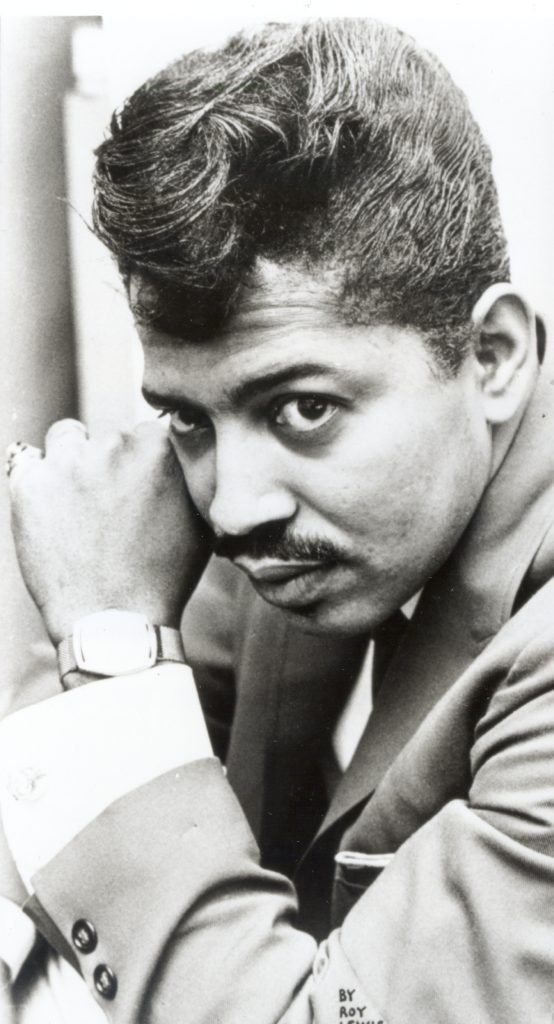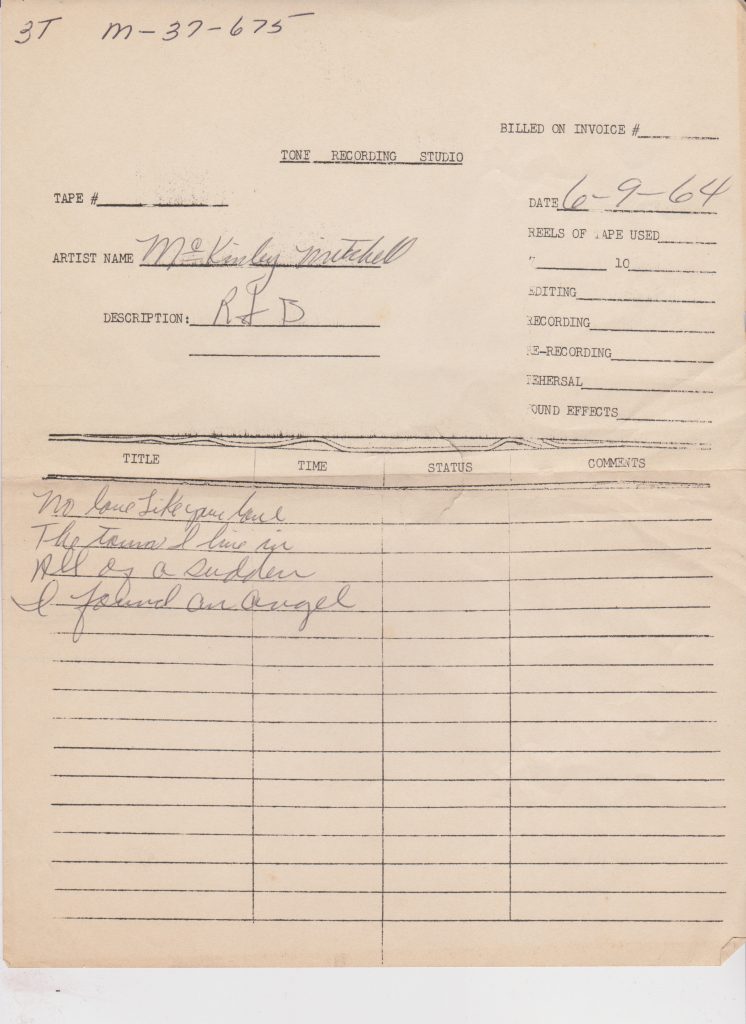Excerpted from the liner notes of The One-Derful! Collection: One-Derful! Records (Secret Stash Records SSR-35.1), by Bill Dahl.

Taking a more circuitous route to Chicago than most of his labelmates, McKinley Mitchell was the first star on the One-derful! roster.
The powerful singer was born on Christmas Day of 1934 in Jackson, Miss. His early musical experience was in gospel; at 16 he fronted the Hearts of Harmony, who migrated to Springfield, Massachusetts. There, Mitchell got his first taste of secular action, singing with guitarist Tiny Button’s quintet. When the Hearts broke up in ‘56, McKinley went to Philadelphia and formed another spiritual outfit, the Mitchellairs.
Next stop: Chicago. Mitchell arrived in 1958, waxing his debut the next year for El Dorados manager Johnny Moore’s tiny Boxer label. “Lazy Dizzy Daisy” and its flip side “Rock Everybody Rock” were an intriguing blend of raw Chicago blues and rock and roll, with longtime Howlin’ Wolf lead guitarist Willie Johnson burning up his strings.
McKinley didn’t locate another recording opportunity until he brought a demo of the haunting self-penned ballad “The Town I Live In” to George Leaner in late 1961. On New Year’s Day of ‘62, Leaner brought the young singer into the studio with veteran trumpeter King Kolax leading the band, including guitarist Thomas “Curley” Palmer, a former Sonny Thompson sideman, and drummer Steve Boswell (he was on Willie Mabon’s ‘53 Chess smash “I’m Mad”). The maiden names of George and Ernie Leaner’s wives, Verlie Rice and Jeanne Dodd, were added to the writers’ credits for the first of many times (Rice worked in the label’s front office).
Released early that year with the sleek, organ-cushioned minor-key “No One (Like My Love)” occupying the other side, “The Town I Live In,” with Mitchell’s tenor floating over the ice cream chord changes until he fired up the grit halfway through, soared to #8 on Billboard’s R&B charts that spring (it bubbled under the pop Hot 100).
Trying to match its commercial success would prove vexing. Mitchell’s encore, “All Of A Sudden,” released early that summer, captured some of the smoky charm of “The Town I Live In” in a minor-key blues mode, Kolax’s trumpet shining on the intro and the organ once again prominent. A Latin tinge distinguished the feisty backing on the other side, “I Found An Angel,” with McKinley’s fiery vocal incorporating a few of Sam Cooke’s trademark trills. Later in the summer, “All Of A Sudden” reappeared as half of Mitchell’s next single, coupled with his intense self-penned “I’m So Glad,” a stirring ballad in the tradition of “The Town I Live In.”
A female chorus harmonized behind McKinley on “Darling That’s What You Said,” an appealing mid-tempo late ‘62 effort that came attached to the fierce rocker “You’re Not Gonna Break My Heart.” Mitchell blamed his lack of follow-up hits on the loss of Kolax, but modernizing his sound with guitarists Cash McCall and Freddy Robinson was a wise move.
“A Bit Of Soul,” out in the summer of ‘63, seems irresistible in retrospect. Mitchell, who co-wrote it with co-producer Milt Bland and David Wilkerson, detailed all the requirements to score a hit: tight words, “tender and bold,” a piano man and a “great big band,” and a whole lot of soul. Perhaps Brook Benton’s similar “Hit Record” sufficiently covered the concept a couple of years earlier; Mitchell’s formula didn’t pay off on the charts. McKinley teamed with producers Bland and Otha Hayes to brainstorm the incendiary B-side ballad, “Hand Full Of Sorrows.”
No longer answering to Milt Bland, Monk Higgins penned the mid-tempo grinder “Tell It, Like It Is,” eliciting an entrancing effort from Mitchell. On the other side of the 45, out in late ‘63, sat “Uncle Willie,” one of several numbers commemorating the Chicago-generated dance.
Williams and Hayes gave McKinley a joyous “It’s Spring,” timed to cash in on the 1964 changing of the seasons; “You Know I’ve Tried,” a torrid, brass-powered rocker, was its plattermate. Monk came up with both derivative sides of Mitchell’s One-derful! swan song in the spring of ‘65. “I’m Ready” cloned Sam Cooke’s “Shake,” while the guitar riff at the heart of the Miracles’ “You’ve Really Got A Hold On Me” winds through Mitchell’s “Watch Over Me.”
“McKinley was a nice guy. He was very popular in the local South Side clubs at that time,” said Otis Clay. “Kind of a pretty boy too. All the little things that worked.”

Eight singles were by no means the extent of Mitchell’s One-derful! discography. Over in Great Britain, the President label put out a 1967 album by the singer that introduced “I’ve Been Wrong,” “Reckless Lover,” “I Wonder Do You,” and “There He Goes,” and a 1979 collection on Japanese P-Vine unearthed “Stop Crying Over You,” “Don’t You Know That’s Love,” and the pummeling “I Think You’re The Girl.”
This collection debuts two previously unheard Mitchell titles, a soul-pumping “Now That You’re Gone” and the upbeat blues “What Love Will Make You Do.” That doesn’t exhaust the mother lode of unissued Mitchell gems: In 1969 McKinley recorded a session for the Leaners’ Empire Productions, including a beautiful rendition of his self-penned “The End Of The Rainbow” (which will be included on the forthcoming Midas Records compilation), long before he utilized the yearning ballad as his 1977 comeback hit for Chimneyville.
Mitchell’s post-One-derful! recording career was at times baffling. He masqueraded as Billy Bland (ostensibly the East Coast singer that hit big in 1960 with “Let the Little Girl Dance”) for “She’s Married Already” under Higgins’ direction at St. Lawrence in 1966. Mitchell followed Monk over to Chess for a ‘67 one-off, “Playboy,” issued under his own name and officially produced by Willie Dixon.
45s for Sandman, Black Beauty, and Spoonful preceded Mitchell’s return to Jackson, Miss., where his career was reborn with “Trouble Blues” in 1976. The song started out on the Big 3 label and was reissued on Malaco’s Chimneyville logo. The success of “The End Of The Rainbow” led to Mitchell’s eponymous Chimneyville LP. A stream of product on Malaco, Southern Biscuit, Retta’s, and Big Boy brought him into the ‘80s. Mitchell died January 18, 1986 of heart failure in Chicago Heights, a southern suburb of the Windy City.
